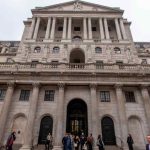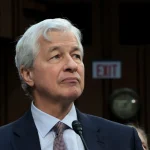John Sibley/Reuters
- The Bank of England sharply increased its forecast for 2021 UK economic growth to 7.25%.
- It cited the successful rollout of coronavirus vaccines and falling COVID-19 cases.
- The BoE held interest rates at 0.1% and kept its bond-buying programme steady.
- Sign up here for our daily newsletter, 10 Things Before the Opening Bell.
The Bank of England sharply upgraded its forecasts for the UK economy on Thursday, citing the successful rollout of coronavirus vaccines and a sharp drop in COVID cases.
Policymakers at the Bank kept interest rates at the record-low level of 0.1% and maintained the size of its bond-buying package, through which the BoE injects money into the economy, at £895 billion ($1.25 trillion).
The BoE predicted UK gross domestic product will grow 7.25% in 2021, considerably higher than its February estimate of 5% growth. UK GDP contracted 9.8% in 2020, the worst slump out of the G7 countries.
The Bank said the unemployment rate should now peak at just under 5.5% in the third quarter of 2021, down sharply from an earlier estimate of a 7.75% peak. And it said UK GDP should recover its pre-pandemic level towards the end of 2021, earlier than previously expected.
“New COVID cases in the United Kingdom have continued to fall, the vaccination programme is proceeding apace, and restrictions on economic activity are easing,” the bank said in its monetary policy statement.
The central bank’s monetary policy committee (MPC) said that while the overall size of its quantitative easing (QE) program would remain the same, the weekly pace of its purchases would slow somewhat.
Thomas Pugh, UK economist at consultancy Capital Economics, said this move was not due to the strength of the economy. “The MPC has always said that it aimed to finish the £150 billion of QE announced last November ‘around the end of 2021’, so the pace of asset purchases was always going to slow at some point,” he said.
The UK has achieved one of the fastest vaccine rollouts in the world, with 51% of the population having received at least one dose by May 4, according to Our World In Data. That compared to 63% in Israel and 44% in the US.
Business and consumer confidence has picked up, as coronavirus cases have fallen following strict lockdowns in January and February and the government has gradually reopened the economy.
On the topic of inflation, which has unnerved financial markets in recent months, the Bank said it expected a short-term spike followed by a fall. It said year-on-year inflation is expected to rise above the Bank’s 2% target towards the end of 2021 before returning to around 2% in the medium term.
Powered by WPeMatico




